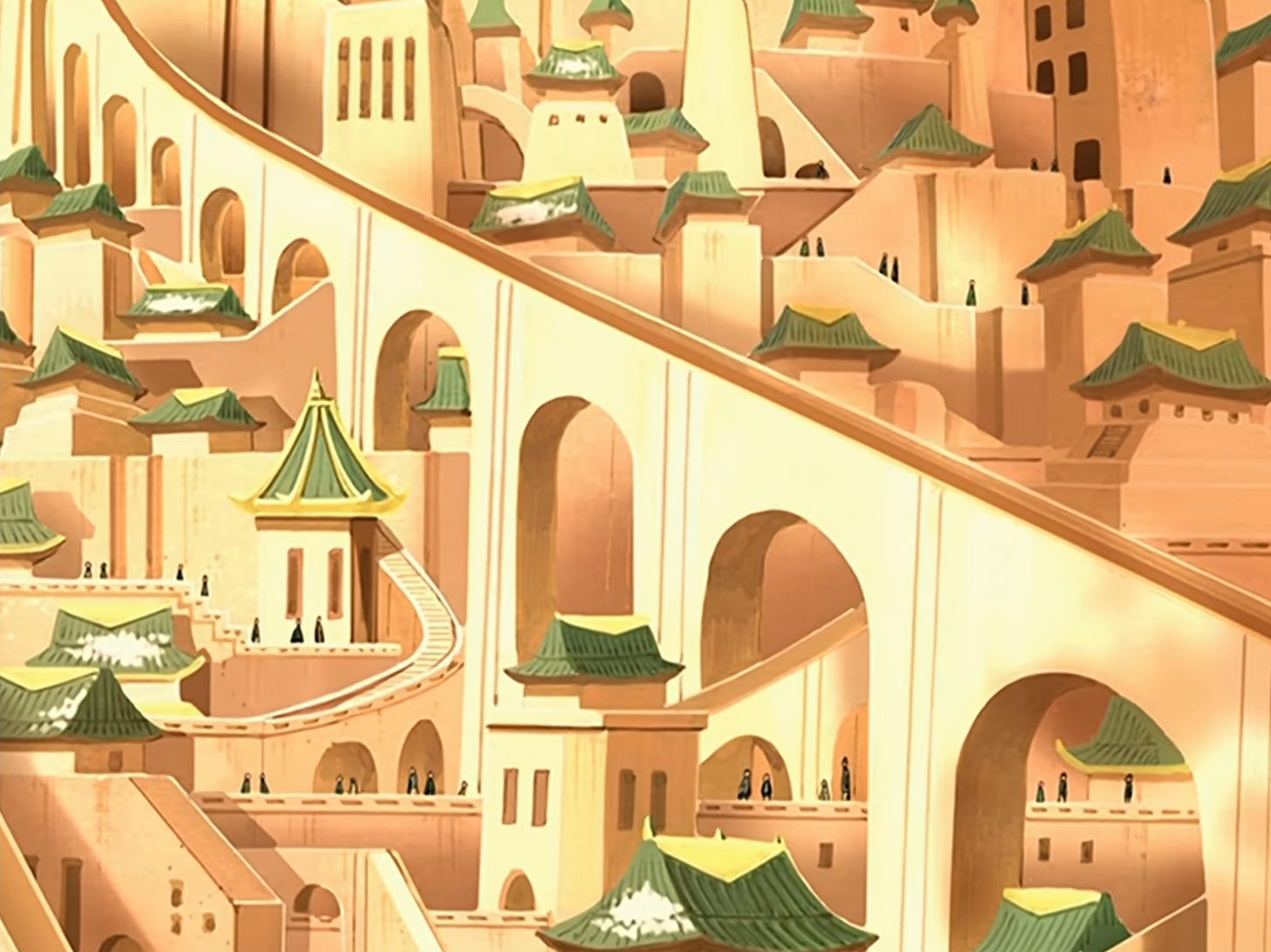Merry Christmas, and thanks for tuning in to my fifth of 61 daily reviews of Avatar: The Last Airbender! Yesterday, we watched S1E4: The Warriors of Kyoshi.
How much do we change over the course of our lives? As an archetypal bildungsroman, Avatar spends much of its runtime arguing that it’s possible for people to change and improve themselves. But this episode specifically focuses on the opposite of that: the ability to preserve one’s essence over a long period of time.
Through effort, we can improve ourselves by changing our circumstances, or controlling how those circumstances affect us. But our fundamental nature remains unchanged.
In this case, that essence is the “mad genius” of King Bumi, once known to Aang as his childhood friend Bumi. After arriving in Omashu, where we meet our first earthbenders, the Gaang gets arrested for abusing the mailing system as “the world’s greatest superslide.” As punishment, the king decides to throw them… a feast! And then he traps Katara and Sokka in creeping crystals and forces Aang to solve a series of challenges that test his out-of-the-box thinking. Eventually, Aang is able to figure out Bumi’s true identity and the two old friends reconcile.
It’s thanks to Bumi’s eccentricity that Aang can identify him. But why does Bumi retain his distinctive personality over one hundred years, even after becoming the King of Omashu? (We don’t get an indication of how he ascended to the crown, either.) The show understands that change takes intentionality hard work, so maybe Bumi just wasn’t interested in changing. But that’s an oversimplistic take. My interpretation of the show’s philosophy is that people have a fundamental, immutable nature — our inner light. And like a lampshade that obscures the light, we have a mindset and physical circumstances that may cause us to behave in specific ways, that sometimes go against our true nature. Through effort, we can improve ourselves by changing our circumstances, or controlling how those circumstances affect us. But our fundamental nature remains unchanged. More on this in the Friends of the White Lotus section.
While Bumi’s challenges are mostly banal, of the best episode’s most exciting scenes is the showdown between Bumi and Aang (who thinks he’s being clever by picking an elderly opponent). I can still remember my awestruck horror when I first witnessed the frail old king’s hulking transformation. It’s our first earthbending battle, and what an impressive performance Bumi gives us! We get to watch him launch boulders, sink Aang into quicksand, smack him down with a massive stone hand, and erupt pillars of rock; and for the grand finale, he rips a colossal chunk out of the arena.
After nearly two decades and a dozen rewatches, there’s no major surprises left for me in this show. But for a young audience not trained to seek meaning in every shot, the show’s subtle hints are probably enough to keep Bumi’s identity a secret until the big reveal. It’s not the most tender reunion, but we get a heartwarming shot of the pair reenacting their glory days on the world’s greatest superslide, proving that some things never really change.
See you tomorrow for Episode 6: Imprisoned! Share your own thoughts on this episode in the comments.
Spare observations
“June Pippinpaddleopsicopolis. Nice to meet you.” Nice save, Katara.
Who decided to mail six spears? There’s gotta be a better packaging strategy…
“MY CABBAGES!” The most famous running joke from the entire series, and it all starts here.
Aang failing to shove an engorged Momo through an air vent is one of the show’s funnier visual gags.
According to the (now-defunct) Avatar Index, Bumi’s pet Flopsie is a goat gorilla.
This is the first episode that doesn’t feature Zuko and Iroh.
Friends of the White Lotus [SPOILERS]
Bumi is the only character in the show alive before Aang was frozen. He’s 112 in this episode. It’s unclear how he remains so powerful at that age.
“I'm the most powerful earthbender you'll ever see,” Bumi tells Aang. Toph would like a word, but who’s really the strongest? It’s one of the fandom’s great debates.
Continuing my discussion of people’s unchanging true nature: Zuko is the show’s ultimate argument for our ability to change ourselves. But even Zuko, in all his Season 1 angst and rage, seems to be “good” at heart. Over the course of three seasons he learns to control his emotions and deprogram himself, but at some level his personality is still the same. We can see this most clearly in his interactions with his Uncle Iroh throughout the show. This understanding of a “true nature” that can be obscured and modulated by one’s circumstances squares with Avatar’s stance that humans are fundamentally good. But how does this apply to characters like Azula, who are not offered redemption? I think even Azula has the good light within, but it’s been so deeply hidden by her harrowing upbringing that it goes unseen. Only in her fleeting visions of her mother Ursa do the cracks begin to show through the facade.





